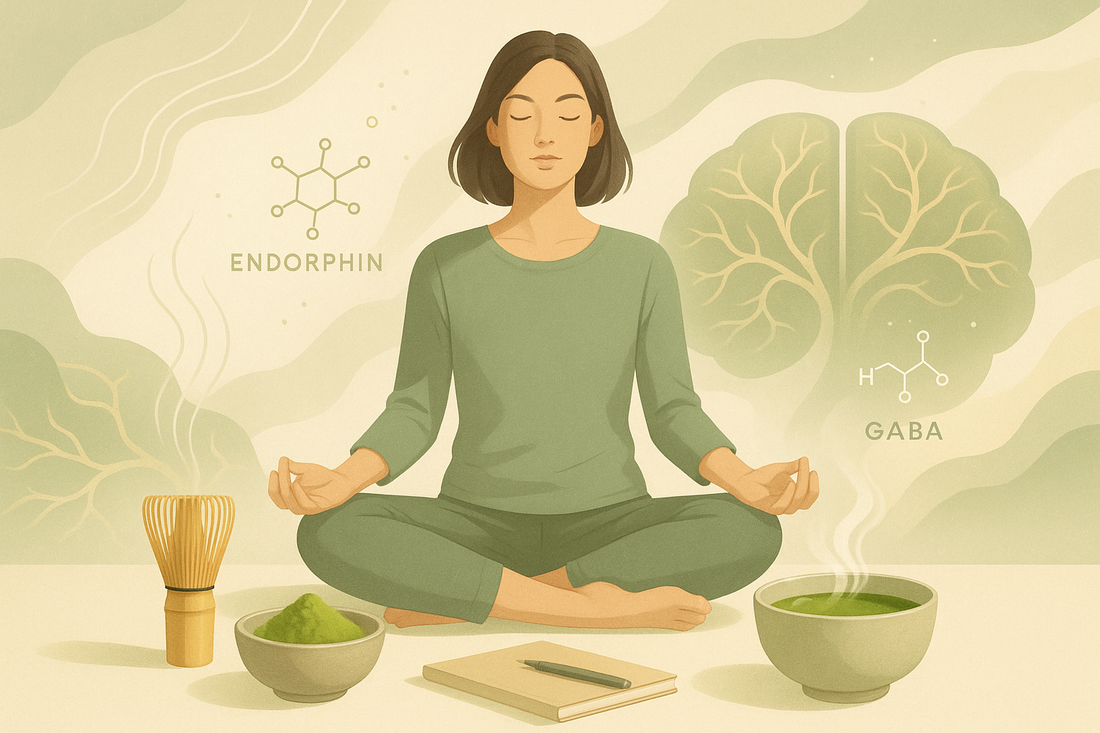
Yoga and matcha share more than a calming vibe—both enhance mental clarity, mood and physical resilience. This article explores the science behind yoga’s brain‑boosting effects, how matcha’s unique combination of caffeine and L‑theanine complements a mind‑body practice, and offers suggestions for integrating the two into your routine.
Yoga sharpens the mind and lifts the mood
Beyond flexibility and strength, yoga rewires the brain. Harvard Health reports that regular yoga creates new neural connections and increases the thickness of the cerebral cortex and hippocampus, the brain regions responsible for learning and memoryhealth.harvard.edu. People who practise yoga show improvements in attention, processing speed and executive functionhealth.harvard.edu. Yoga also modulates neurotransmitters: it boosts mood‑enhancing endorphins and elevates levels of gamma‑aminobutyric acid (GABA), a neurotransmitter linked to reduced anxiety and improved moodhealth.harvard.edu. Slow, diaphragmatic breathing activates the parasympathetic nervous system, lowering stress hormoneshealth.harvard.edu.
Matcha’s calm energy
Unlike coffee’s jittery spike, matcha’s caffeine is paired with an amino acid called L‑theanine. A systematic review found that combining L‑theanine with caffeine speeds up reaction time and working memory, improves accuracy on cognitive tasks, and increases alertness, while simultaneously reducing headaches and feelings of tirednesscureus.com. Another study showed that drinking matcha during cognitively demanding tasks led to better attention and more work completed, suggesting that the caffeine‑theanine synergy supports sustained focuscureus.com. This calm, focused energy makes matcha an ideal complement to yoga, where you want to be alert yet grounded.
Designing your matcha‑yoga ritual
Before your practice: Sip a House of Matcha oat latte about 30 minutes before your session to allow the caffeine‑theanine duo to take effect. As you prepare your mat, take a few rounds of cyclic sighing—inhale through the nose, take a second sip of air and exhale slowly through the mouth—to quiet your mind and prime your nervous system. Research from Stanford shows that five minutes of exhale‑focused breathing lowers anxiety and increases positive emotionsstanmed.stanford.edu.
During practice: Flow through poses at a pace that allows you to synchronise movement and breath. Whether you’re holding Warrior II or moving through Sun Salutations, pay attention to the sensations in your muscles and the steady hum of energy from your latte. If you’re in a group class, notice the collective rhythm of inhales and exhales—it can deepen your sense of connection.
After practice: Rehydrate with another sip of matcha or with water infused with slices of cucumber and lemon. Take a few minutes to journal about how you feel—journaling has been shown to reduce anxiety and obsessive thinking, improve emotional regulation and self‑esteem, and even provide physical benefits like lower blood pressure and improved organ functionpositivepsychology.com. Share your reflections or a photo of your post‑yoga glow with our community to inspire others.
Build community through movement
Yoga has always been about connection—to self, to breath and to others. Consider joining a local yoga studio, beachside class or organising your own sunrise flow with friends. When you practise together and share a matcha afterwards, you not only support your own health but also contribute to a culture of kindness and support. Research shows that helping others (prosocial behaviour) benefits the giver as much as the receiverhsph.harvard.edu—so offering a fellow yogi a spare mat or an extra matcha can boost your own well‑being. Don’t forget to tag @HouseofMatcha in your yoga photos; we love featuring community members on our feed.
References
-
Harvard Health reports that yoga creates new neural connections, increases cortical thickness and strengthens the hippocampus, leading to improvements in learning, memory and executive functionshealth.harvard.edu. Yoga also boosts mood by increasing endorphins and elevating the inhibitory neurotransmitter GABA, which is associated with reduced anxietyhealth.harvard.edu. Slow breathing in yoga activates the parasympathetic nervous system and lowers stress hormoneshealth.harvard.edu.
-
A systematic review of caffeine and L‑theanine found that their combination improves reaction time, working memory and cognitive accuracy, while reducing headaches and tirednesscureus.com. Continuous matcha consumption during demanding tasks improved attention and work performancecureus.com.
-
Stanford researchers discovered that five minutes of cyclic sighing—an exhale‑focused breathing practice—significantly reduces anxiety and increases positive feelingsstanmed.stanford.edu.
-
Positive psychology research shows that journaling reduces anxiety and obsessive thinking, improves emotional regulation and self‑esteem, and provides physical benefits such as lower blood pressure and improved organ functionpositivepsychology.com.
-
Harvard experts advocate for prosocial behaviours, noting that helping others through volunteering or acts of kindness benefits the giver as much as the receiver and contributes to better community healthhsph.harvard.edu.